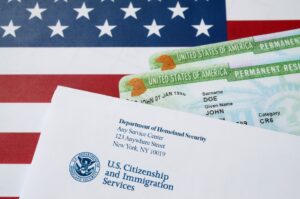The recent extension of U.S. green card validity for people with conditional permanent residency has allowed for flexibility in the face of delays on the part of the United States Citizenship and Immigration Service (USCIS). If you have a green card as a conditional permanent resident, it helps you know the steps to take to apply for the extension, the documentation you need, and your options in case issues arise.
What is Conditional Permanent Residency?
In 1986, the Immigration and Naturalization Service (INS)—which was the precursor to USCIS—estimated that one in three marriages between a U.S. citizen and a foreign national were fraudulent. That same year, Congress began enacting tougher requirements for marriage-based green cards and introduced the “conditional green card” as part of the effort to deter sham marriages.
The INS was wrong about its estimate and eventually admitted that only a relatively small percentage of marriage-based green card applications are fraudulent. Less than one percent of marriage-based green card applications are denied for fraud.
Conditional permanent green cards still remain. A conditional permanent resident receives a non-renewable green card valid for only two years instead of a permanent green card, which is renewable and valid for 10-year periods.
Recent Extension of Conditional Permanent Residency Green Cards
In early 2023, United States Citizenship and Immigration Services (USCIS) started extending the validity of Permanent Resident Cards—also known as green cards—for 48 months beyond the card’s expiration date for petitioners who successfully file Form I-751, Petition to Remove Conditions on Residence or Form I-829, Petition by Investor to Remove Conditions on Permanent Resident status. Those who file those forms and get them approved are referred to as conditional permanent residents. USCIS made this accommodation in response to a significant increase in processing times for these forms in 2022.
To remove the non-renewable and two-year conditions on your permanent resident status, you must file a petition within 90 days before your conditional green card expires.
In the case of marriage-based immigration, you will need to prove again that your marriage is real after these two years. After you provide that proof, you’ll be able to get a permanent green card, valid for 10–year renewable periods. (The letters “IR1” on the physical green card stand for “immediate relative.”)
How to Apply For Removal of Conditions
If you or your spouse has conditional permanent residency, you’ll need to file Form I-751, the “Petition to Remove Conditions,” so that you can get a permanent green card. Here are some of the most important things to remember:
- You’ll need to file your I-751 during the 90-day window before your conditional permanent residency expires. Your application will be returned if it’s filed too early or denied if it’s filed late, and you can’t explain any extenuating circumstances that caused the late filing.
- The Form I-751 is a joint petition. Both you and your spouse will need to complete the form together, and both of you need to sign the form.
- You’ll need to include additional evidence that your marriage is real. USCIS expects that since you’ve been married for two years longer, you’ll have new photos together, new joint financial account documentation, utility bills, and birth certificates of the children you have had together. You should include the same types of evidence that you included with your original green card application, but it should be evidence that you’ve accumulated in the time since your original green card application was approved.
- You’ll need to include a copy of the front and back of your conditional green card, along with the filing fee ($595) and biometrics fee ($85), for a total of $680.
- USCIS may choose to waive the previously mandatory interview with an officer to remove residency conditions if the evidence submitted by you and your spouse is strong enough to convince the reviewing officer that the marriage is legitimate.
How to Prove Your Extended Status After You Apply
To prove your lawful extended status, you can present the receipt notice that you received when you filed your I-751 for the 24-month extension, along with your Permanent Resident Card. This shows evidence of conditional resident continued status for up to 24 months past the expiration date, even as your Removal of Conditions application remains pending with USCIS.
If the letter expires and the USCIS office still hasn’t processed your petition, you should contact the USCIS local field office nearest to you to get information on what to do and request a new letter.
If Your Green Card Expires Before Extension
Your green card may expire before you file for an extension or before USCIS processes your application. When your green card expires, you don’t have conditional residence anymore. So filing your I-751 late may compel USCIS to put you in deportation proceedings.
Filing late will likely not get you deported automatically if your lateness is due to credible reasons. Also, even if you apply on time, the backlog at your local USCIS field office could simply lead to a failure to process your form before your green card expires. Either way, you should take action as soon as possible.
Late filing: You can still file a late Form I-751 if your conditional green card has expired. USCIS would make exceptions if the delay were due to extraordinary circumstances, especially if those beyond your or your spouse’s control, and if the USCIS deems that the length of the delay was reasonable. You should submit with your application a letter that explains why you are filing late. Make sure you provide rational reasons and attach relevant documents that support your statement.
Delayed process: If your conditional green card extension expires before your removal of condition application is processed, a USCIS officer can either stamp a one-year extension in your valid and unexpired passport or place a one-year extension sticker in your expired green card. This extension while you wait for USCIS offices to process your petition will enable you to renew your driver’s license, travel internationally, get a new job, and pretty much prove that your current green card is still valid.
Either way, you should consider seeking the advice of an experienced immigration attorney who can ensure you’re back into a lawful status.
Contact an Immigration Attorney
Do you have questions about the conditional permanent residency green card extension? Then contact US Immigration Law Counsel® through our website or by calling 1-800-666-4996. We deal with the government so you don’t have to. We look forward to helping you at this time.




